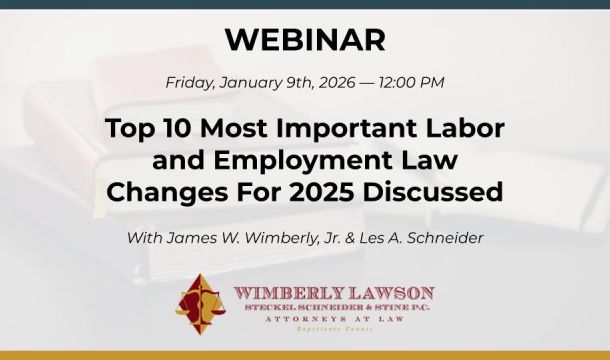New NLRB Case Forces “Card-Check” Analysis on Employers
Probably no National Labor Relations Board (NLRB) concepts scares employers more than the concept of the “card-check.” This is a concept where an unwanted union is forced on the employer and employees are deprived of the right to vote on the issue in a secret ballot election. On August 25, 2023, the NLRB accomplished almost the same result in Cemex Construction Materials Pacific, 372 NLRB No. 130.
For over 50 years, the NLRB and the courts have recognized the principle that an employer may decline a union’s demand for recognition, even when the union asserts that it secured union authorization cards from a majority of voters and offers to prove that to the employer. Exceptions to this general rule have been where the employer has committed such egregious unfair labor practices that the possibility of erasing the effects of such practices and insuring a fair election are slight, so that employee rights are better protected by a bargaining order, meaning the employee sentiment has previously been expressed through union authorization cards. The statute expressly states that secret-ballot elections are the preferred method of determining a majority status, so issuance of bargaining orders under this concept have been rare.
Under the totally new standard adopted by the NLRB in the Cemex case, however, the employer violates the Labor Act by refusing to recognize, upon request, a union that has been designated as representative by the majority of employees in an appropriate unit, unless the employer promptly files an election petition itself to test the union’s majority status or the appropriateness of the unit (unless the union has already filed such a petition). The employer must seek an election within two weeks of the demand for recognition, absent unforeseen circumstances. If the employer commits an unfair labor practice that requires setting aside an election, a petition (whether filed by the employer or the union) will be dismissed, and the employer will be subject to a remedial bargaining order to recognize and bargain with the union. All three Democratic appointees to the Board unanimously supported the new concept, while the lone Republican appointee dissented.
The Board majority notes that an employer does not have to file an election petition but should the union file a charge alleging that the employer’s refusal to bargain violates the Act, the employer must test the basis for the union’s claim to majority status in a subsequent unfair labor practice proceeding. However, an employer that chooses not to file an election petition does so at its peril should the unfair labor practice proceedings establish that the union was, in fact, designated by a majority of employees as representative.
The Board justifies its new standard by saying that it only applies where the employer frustrates the election process by the commission of unfair labor practices. The Board majority further states that under the new standard, employers seeking an election will be incentivized not to commit unfair labor practices in response to a union campaign, both before and after the filing of the election petition.
The NLRB majority rejects the views of the dissenting member. The dissenting member first argues that a “card-majority union” runs counter to the policies of the Labor Act because it deprives employees of their “right to vote in a secret-ballot election.” The majority rejects this argument because a majority of employees designated the union by the union authorization cards as representative, thus there is no risk of forcing a union on a non-consenting majority of employees. Further, the employer remains free in the unfair labor practice proceedings to establish that the union’s showing of majority support is deficient because of irregularities in the procurement of union authorization cards, or that the bargaining unit claimed by the union is inappropriate.
The dissenting Board member also argues that, under the Board’s new ruling establishing the framework for evaluating the lawfulness of employer work rules in Stericycle, Inc., 372 NLRB No. 113 (2013), it is virtually impossible for an employer not to commit an unfair labor practice that would require setting aside the results of an election, which means “it is virtually impossible for an employer’s petition not to be dismissed, or the employer not to be found to have violated [the Act], and for a bargaining order not to issue.” The majority responds that not every unfair labor practice will result in a bargaining order, stating that a bargaining order will not issue in every case on the basis of an employer’s unlawful maintenance of an unlawful handbook provision.
Comments on the Cemex Ruling and Its Ramifications
The ruling in Cemex is an employer’s “worst nightmare.” Employers have long feared the proposed Pro Act in Congress in part because of the card-check provisions, but now this ruling does almost the same thing. President Biden has bragged about being the most “pro-union” President in history, and arguably this NLRB majority is the most “pro-union” in history. However, this writer believes there may be an unintended consequence of the ruling.
It is hard to get around the dissent’s argument that even minor unfair labor practices committed by an employer will result in dismissal of any secret-ballot election petition and result in unfair labor practice litigation. In short, the result will be to change the environment from the secret-ballot election to instead one of litigation.
Even the majority identifies two types of litigation. It points out that the employer is free to contest the union’s claim by contending in the litigation “that the union’s showing of majority support is deficient because of irregularities in the procurement of cards or otherwise, or that the unit claimed by the union is inappropriate.” The union’s majority status is invalid if the union cards do not serve as a reliable indicator of employee sentiment. For example, the union authorization cards will be deemed invalid if the organizer misrepresents the card’s nature or purpose, or if there has been coercion or misrepresentation in the union card solicitations. This writer has litigated a number of cases over the years involving such issues and won. One such line of defense is if the card signers were told that signing the union card is “only” for an election. Or, the cards may not have valid signatures or there may be no way to prove the validity of the signatures. Also, complex issues as to the total number of potential eligible voters, and whether certain job categories should be included or excluded from those on which the majority depends, and the appropriate date of the majority determination. In short, this ruling may have the reverse effect of substituting litigation lasting for years, over a quicker secret-ballot election.
Another relevant issue in the litigation may be revocation of previously-signed union cards. Employers can lawfully advise employees that they have the right to revoke any union cards they have signed, and these type issues are also often litigated. Organizing campaigns may thus generate anti-card signing campaigns and employers educating employees about their right to revoke union cards already signed.
Unions may applaud the decision and expect employers to simply give in when their unfair labor practice charges are filed, rather than risk expensive litigation. There is also the possibility that the opposite may occur, incentivizing unions not to file charges preferring a relatively quick secret-ballot election. On August 18, 2023, the NLRB issued a regulation overruling some of the Trump-era rules and facilitating the “quickie election” process, in which Regional directors will be advised to schedule elections at the earliest possible date. Employers may end up with only a couple of weeks to advise or educate employees of the disadvantages of union representation.
Another matter to consider is that unions often try to conduct the early stages of their campaigns in secrecy, and it is not unheard of that employers may not even know of the organizing for a considerable period of time. The union then “springs” the union on the employer at a time the employer has very little time to react and counter the union momentum. After all, unions can lawfully tell employees that they have nothing to lose by signing a union card, and that there will be no union dues unless the union is selected and has negotiated a significant pay increase.
Another fallacy of the new concept is that many unfair labor practices are totally innocent. An employer official may react to organizing rumors by asking an employee whether union activity is going on, or what the issues are causing employees to go to a union. These are entirely logical and considered innocent statements by an employer, and yet the NLRB considers them to be serious unfair labor practices.
We come back to the issue that an employer has to be prepared for organizing in various ways. Employers may wish to orient new hires on its union-free status, pointing out there is no need to pay union dues or risk work stoppages to receive improved pay and benefits, now or in the future. Employers not only set up good internal complaint procedures, but also have ways such as roundtable discussions to receive feedback from employees about working conditions in the facilities. Many other steps can be taken to maintain union-free status in spite of the new NLRB ruling, which may not withstand court review.
Questions? Please contact James W. Wimberly, Jr. at 404-365-0900 or email him here.
Related Content
Get Email Updates
Recent Content

Department of Homeland Security (DHS) is Terminating Family Reunification Parole (FRP) Processes

DHS is Terminating Temporary Protected Status for Ethiopia

Issues Regarding Employee Access to Their Personnel Files

Issues of Employer Access to Employees’ Personal Devices Such as Cell Phones, Etc

Settlement Agreement Wording Can Determine Tax Treatment



